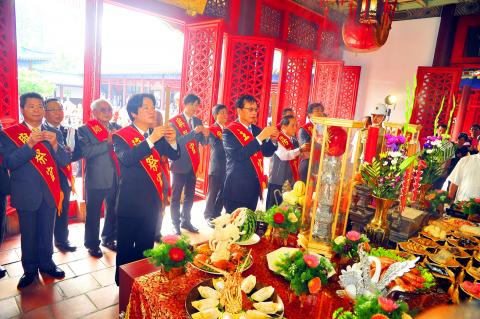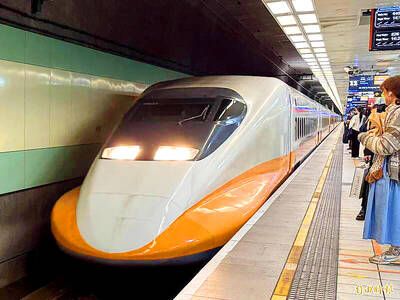Breaking with 54 years of tradition, the central government will not send the interior minister to preside over an annual ritual memorializing Koxinga in Tainan, the Ministry of the Interior said, citing the nation’s autonomy and cultural pluralism in its decision.
Koxinga, also known as Cheng Cheng-kung (鄭成功), was a Ming Dynasty loyalist and military commander who in 1662 conquered Taiwan from the Dutch for use as a base of operations against the Qing empire.
The Tainan government in 1946 established the veneration of Koxinga as an official annual event as a sign of support for the political ideology that led him to drive away the Dutch and use Taiwan as a base to “overturn the Qing Dynasty and restore the Ming Dynasty.”

Photo: Wang Chieh, Taipei Times
The former Taiwan Provincial Government Consultative Council in 1962 proposed that the central government endorse the event by dispatching a minister to act as its master of ceremonies. The Executive Yuan in April the following year issued a resolution to that effect and set the date of the event as April 29, with the interior minister serving as the master of ceremonies.
Democratic Progressive Party Legislator Kolas Yotaka on Saturday said she does not oppose members of the Cheng clan holding private religious events in celebration of their ancestor, but that any state endorsement of those rituals would be inappropriate.
“To the Siraya people and other Aborigines, Koxinga’s arrival in Taiwan resulted in the extermination of our communities, and our people were forced to flee as refugees to the mountains, much like Chiang Kai-shek’s (蔣介石) massacre of Taiwanese during the 228 Incident,” she said.
Aboriginal groups have repeatedly lobbied the government to address the atrocities Koxinga committed against Taiwan’s Aborigines, and in August last year, President Tsai Ing-wen (蔡英文) made an official apology.
During a legislative session last month, Yotaka told Minister of the Interior Yeh Jiunn-rong (葉俊榮) that he should not officiate the Koxinga ceremony this year.
While Yeh at the time did not indicate whether he was to attend the event, he did say that Taiwan is a pluralistic society and that he would keep in mind that the tradition might offend some people.
The ministry later decided against participating in the event for “reasons of empathy” and filed a request with the Executive Yuan to have local officials take care of the matter instead.
The Executive Yuan has tasked Tainan Mayor William Lai (賴清德) with presiding over this year’s event, which is to take place on Saturday, the interior ministry’s Senior Executive Officer of Civil Affairs Cheng Ying-hung (鄭英弘) said on Saturday, adding that the government had changed its policy to show its respect for opinions from all corners of the nation’s pluralistic society.
“The ministry will play no role whatsoever,” he said, adding that Yeh would not attend the Koxinga event in any capacity and that Lai is to be its master of ceremonies.
Cheng Ying-hung said the Koxinga ritual was overseen by the Tainan City Government in its early days and the central government only began officiating it on the suggestion of the Taiwan Provincial Consultative Council.
The change of policy merely changed the rituals back to their original state, Cheng said, and Tainan’s elevation to a special municipality had obviated the need for a central government official to attend.
Moreover, the event had changed from a commemorative ritual to a cultural tourism festival, he said.
The government respects changes in Taiwan’s pluralistic culture, and social change is inevitable, he added.

The inspection equipment and data transmission system for new robotic dogs that Taipei is planning to use for sidewalk patrols were developed by a Taiwanese company, the city’s New Construction Office said today, dismissing concerns that the China-made robots could pose a security risk. The city is bringing in smart robotic dogs to help with sidewalk inspections, Taipei Deputy Mayor Lee Ssu-chuan (李四川) said on Facebook. Equipped with a panoramic surveillance system, the robots would be able to automatically flag problems and easily navigate narrow sidewalks, making inspections faster and more accurate, Lee said. By collecting more accurate data, they would help Taipei

TAKING STOCK: The USMC is rebuilding a once-abandoned airfield in Palau to support large-scale ground operations as China’s missile range grows, Naval News reported The US Marine Corps (USMC) is considering new sites for stockpiling equipment in the West Pacific to harden military supply chains and enhance mobility across the Indo-Pacific region, US-based Naval News reported on Saturday. The proposed sites in Palau — one of Taiwan’s diplomatic allies — and Australia would enable a “rapid standup of stored equipment within a year” of the program’s approval, the report said, citing documents published by the USMC last month. In Palau, the service is rebuilding a formerly abandoned World War II-era airfield and establishing ancillary structures to support large-scale ground operations “as China’s missile range and magazine

A 72-year-old man in Kaohsiung was sentenced to 40 days in jail after he was found having sex with a 67-year-old woman under a slide in a public park on Sunday afternoon. At 3pm on Sunday, a mother surnamed Liang (梁) was with her child at a neighborhood park when they found the man, surnamed Tsai (蔡), and woman, surnamed Huang (黃), underneath the slide. Liang took her child away from the scene, took photographs of the two and called the police, who arrived and arrested the couple. During questioning, Tsai told police that he had met Huang that day and offered to

BETTER SERVICE QUALITY: From Nov. 10, tickets with reserved seats would only be valid for the date, train and route specified on the ticket, THSRC said Starting on Nov. 10, high-speed rail passengers with reserved seats would be required to exchange their tickets to board an earlier train. Passengers with reserved seats on a specific train are currently allowed to board earlier trains on the same day and sit in non-reserved cars, but as this is happening increasingly often, and affecting quality of travel and ticket sales, Taiwan High-Speed Rail Corp (THSRC) announced that it would be canceling the policy on Nov. 10. It is one of several new measures launched by THSRC chairman Shih Che (史哲) to improve the quality of service, it said. The company also said